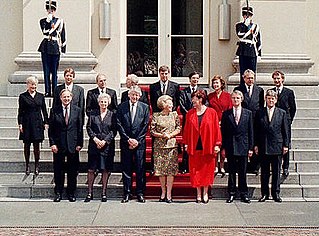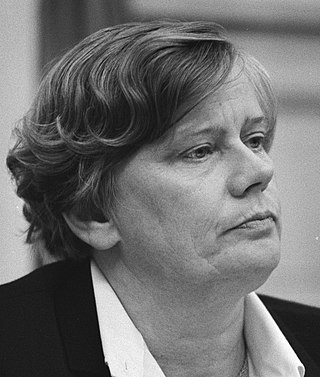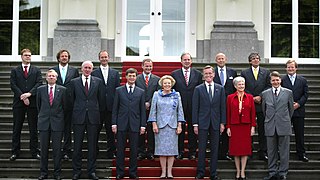The Labour Party is a social democratic political party in the Netherlands.

The second Kok cabinet,also called the second Purple cabinet,was the executive branch of the Dutch government from 3 August 1998 until 22 July 2002.

Democrats 66 is a social liberal and progressive political party in the Netherlands,which positions itself in the centre of the political spectrum. It is a member of the Liberal International (LI) and the Alliance of Liberals and Democrats for Europe (ALDE).

The second Balkenende cabinet was the executive branch of the Government of the Netherlands from 27 May 2003 until 7 July 2006. The cabinet was formed by the Christian-democratic Christian Democratic Appeal (CDA),the conservative-liberal People's Party for Freedom and Democracy (VVD),and the social-liberal Democrats 66 (D66) after the election of 2003. The cabinet was a centre-right coalition and had a slim majority in the House of Representatives with Christian Democratic Leader Jan Peter Balkenende serving as Prime Minister. Liberal Leader Gerrit Zalm,a former Minister of Finance,served as Deputy Prime Minister and returned as Minister of Finance,while former Progressive-Liberal Leader Thom de Graaf served as Deputy Prime Minister and Minister without Portfolio for the Interior.

Johannes Pieter "Jan" Pronk Jr. is a retired Dutch politician and diplomat of the Labour Party (PvdA) and activist.

The Third Lubbers cabinet,also called the Lubbers–Kok cabinet,was the executive branch of the Dutch government from 7 November 1989 to 22 August 1994. The cabinet was formed the christian-democratic Christian Democratic Appeal (CDA) and the social-democratic Labour Party (PvdA) after the election of 1989. The cabinet was a centrist grand coalition and had a substantial majority in the House of Representatives with Christian-Democratic Leader Ruud Lubbers serving as Prime Minister. Labour Leader Wim Kok served as Deputy Prime Minister and Minister of Finance.
Following the 2006 Dutch general election,held on November 22,a process of cabinet formation started,involving negotiations about which coalition partners to form a common programme of policy and to divide the posts in cabinet. On February 22,2007 it resulted in the formation of the Fourth Balkenende cabinet.
A Purple coalition is a common term in politics used to describe governments or other political entities consisting of parties that have red and blue as their political colours. It is of particular note in three countries. In the politics of the Netherlands and Belgium,purple is the term for a government coalition of social democrats and liberals,excluding christian democrats. It is derived from the combination of the colour of the social democrats (red) and liberals (blue).

The Ministry of Housing and Spatial Planning is a Dutch government ministry. It was re-established in 2024 after having been disbanded in 2010. The current minister is Mona Keijzer.

Catharina Isabella "Ien" Dales was a Dutch politician and social worker. Born in Arnhem,she received a degree in education from the University of Amsterdam and worked in social services before her career in politics. She became a member of the Labour Party (PvdA) in 1968 and was appointed State Secretary for Social Affairs and Employment in the Van Agt II cabinet,a position that she held between 1981 and 1982. Dales was a member of the House of Representatives between 1981 and 1987 and mayor of Nijmegen between 1987 and 1989. She was the Minister of the Interior in the Lubbers III cabinet from 1989 and 1994.

The Government of Rotterdam is the government of the municipality and city of Rotterdam in the Netherlands. Most of the inhabitants live in the city of Rotterdam,but the municipality also covers a number of small villages,and other parts of the local government,such as Rozenburg,cover an even larger area.

The third Rutte cabinet was the cabinet of the Netherlands from 26 October 2017 until 10 January 2022. It was formed by a coalition government of the political parties People's Party for Freedom and Democracy (VVD),Christian Democratic Appeal (CDA),Democrats 66 (D66) and Christian Union (CU) after the general election of 2017.
This article lists major events that happened in 2018 in the Netherlands.

Jan Reehorst was a Dutch politician.

Alexandra Carla van Huffelen is a Dutch politician of the Democrats 66 (D66) party.

Barbara Catharina Kathmann is a Dutch politician,serving as a member of the House of Representatives since 2021. She is a member of the Labour Party (PvdA). Before being elected to the House,she served as a municipal councilor and alderwoman in her hometown Rotterdam. Kathmann has also worked in media and at two nonprofit organizations.

Following the Dutch general election on 17 March 2021,a cabinet formation led to the establishment of the fourth Rutte cabinet in 2022. The coalition included the People's Party for Freedom and Democracy (VVD),Democrats 66 (D66),Christian Democratic Appeal (CDA) and Christian Union (CU),the same parties from the preceding third Rutte cabinet. This formation process,lasting 299 days,was the longest formation in Dutch history.

Anne-Marijke Podt is a Dutch politician of the social liberal party Democrats 66 (D66),who has been serving as a member of the House of Representatives since September 2021. She had previously been a member of the Utrecht municipal council starting in 2014,and she has worked as an aid worker and as an independent adviser for municipalities.

After the Dutch general election of 15 May 2002,a cabinet formation took place in Netherlands. This resulted in the First Balkenende cabinet on 22 July 2002. The coalition was formed by Christian Democratic Appeal (CDA),People's Party for Freedom and Democracy (VVD) and the Pim Fortuyn List (LPF).















